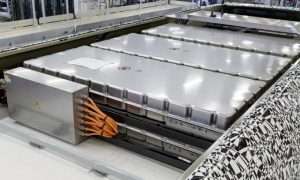German company Akasol presented at the Battery Show Europe its new battery system with 21700 cylindrical-cells, which stores a lot more energy compared to prismatic cells.
AKASOL battery systems
The AKAModule 60 CYC stores 2.66 kWh (221 Wh/kg), at maximum power density of up to 433 W/kg.
The new modules are expected to have high cycle stability in comparison to other high-energy solutions (1,500 to 3,000 operative cycles).
Read Also – See Mercedes-Benz Present Electric Citaro Bus Prototype with Akasol batteries
15 modules make up the AKASYSTEM 15 AKM 60 CYC (40 kWh) system. Many units can be combined to achieve overall capacity of hundreds of kWhs, needed in electric coaches, buses and trucks.
“It’s robust and scalable, and acquisition costs per kWh are comparatively low. In comparison to what current technology permits, this new technology will allow electric vehicles to increase their range by more than 60 percent. This system is developed for long distance traffic, e.g. buses using overnight charging facilities, intercity coaches and trucks.”
Trials of the new system will begin by the end of this year, while series production and sales to begin in mid-2019.
“Both the high-performance battery systems with prismatic cells that are already available and the new high-energy battery systems operate with standardised liquid cooling that does not require exotic chemicals. Akasol works with a standard water-glycol-mix that is widely used in numerous applications of the automotive industry worldwide, for instance in engine cooling. Therefore, it’s not complicated to integrate and validate the necessary components for storing and circulating the cooling agent within the vehicle’s architecture.”
“Akasol continues to build on its modular approach and offers commercial vehicle manufacturers and other users high flexibility: the company presents three exemplary lithium-ion battery systems at booth B386. Each has the same dimensions (700 x 150 x 1700) and contains 15 battery modules with different cell technology fitting the PHEV2 standard module. When demands on performance, energy or cycle stability change at a later stage, users can simply exchange systems.
1) AKASYSTEM 15 OEM 37 PRC (Available since 2018, PHEV2 standard module with prismatic battery cells)The first generation of our high-performance battery systems. A similar model is used in electric bus Citaro by Daimler’s subsidiary EvoBus. It is mass-produced in Germany. Fitted with PHEV2 battery modules with high power density (up to 870 W/kg) based on prismatic lithium-ion cells, this battery system brings together high cycle stability (up to 3,000 cycles) and high performance for utility vehicles.
2) AKASYSTEM 15 OEM 50 PRC (Available from the end of 2019, PHEV2 standard module with prismatic battery cells)This high-performance battery system uses the next generation of high-performance battery modules with high power density (up to 833 W/kg) and significantly higher energy density (approximately up to 183 Wh/kg) based on prismatic lithium-ion cells. This battery system will allow electric vehicles to increase their range by up to 35 percent while occupying the same space as the currently available system and maintaining the same life-time (up to 3,000 cycles). It is planned for series production at the end of 2019.
3) AKASYSTEM 15 AKM 60 CYC (available from mid-2019, PHEV2 standard module with cylindrical battery cells of type 21700)This high-energy battery system with 40 kilowatt hours uses the new cylindrical-cell battery modules with very high energy density (approximately 221 Wh/kg, at maximum power density of up to 433 W/kg). It’s robust and scalable, and acquisition costs per kWh are comparatively low. In comparison to what current technology permits, this new technology will allow electric vehicles to increase their range by more than 60 percent. This system is developed for long distance traffic, e.g. buses using overnight charging facilities, intercity coaches and trucks.”
Stephen Raiser, Co-Founder and Head of Development at Akasol:
“Our new cylindrical-cells battery module allows coaches, city buses and trucks to operate reliably on long distance journeys. Since the driving range of those vehicles increases significantly, the need for charging stations will decrease considerably for many applications. Demand and customer interest in our different solutions is high, which shows that the market is developing rapidly and that requirements on battery systems for commercial vehicles vary a lot. We enjoy applying our many years of experience to finding individual solutions for our clients.”

